Are you a new cat parent? Are you wondering why your 8-week-old kitten is crying at night? Don’t worry, I’ve been there too! Understanding your kitten’s behavior is key to ensuring their well-being and a peaceful night for both of you.
Key Takeaways:
- Kittens may cry at night for various reasons, such as loneliness, confusion, hunger, pain, or illness.
- Loneliness can be alleviated by spending quality time with your kitten and considering adopting an additional kitten for companionship.
- Confusion and being lost can be reduced by providing a smaller “home base” initially and gradually introducing more space in the house.
- Ensuring a proper feeding schedule and offering sufficient amounts of wet food can address hunger-related crying.
- Proper litter box training is crucial to prevent litter box issues and reduce discomfort or confusion.
Now that you understand some of the possible reasons why your little furball is crying at night, let’s delve deeper into each of these factors and explore ways to address them. By taking proactive steps, you’ll help your kitten feel safe, loved, and content, ensuring peaceful nights for both of you.
Possible Reasons for Kitten Crying
Kittens may cry at night for various reasons, and it’s important to understand their behavior to address their needs effectively. Here are some common reasons why kittens might cry and how to address them:
Loneliness
Kittens are social creatures and may cry at night due to loneliness. Spending quality time with your kitten, providing attention, and considering adopting another kitten for companionship can help alleviate their feelings of isolation.
Hunger
Like human babies, kittens may cry when they are hungry. Ensuring a proper feeding schedule and offering sufficient amounts of wet food can address their hunger and reduce nighttime crying.
Confusion and Being Lost
New surroundings can be overwhelming for kittens, causing them to cry out of confusion or feeling lost. Providing a smaller space initially and gradually introducing them to more areas of the house can help them feel more comfortable and secure.
Pain or Sickness
If a kitten is in pain or feeling sick, they may cry to seek help. It’s important to monitor their behavior and consult a veterinarian if the crying persists or is accompanied by other concerning symptoms.
In summary, kittens may cry at night due to loneliness, hunger, confusion, or pain. Understanding the underlying reasons behind their crying can help provide appropriate care and ensure a peaceful night for both you and your kitten.

Loneliness as a Cause of Kitten Crying
One possible reason for a kitten crying at night is loneliness. Kittens are social creatures and crave attention and companionship. When left alone at night, they may feel isolated and start meowing to seek comfort and reassurance. Spending quality time with your kitten during the day can help alleviate their loneliness and reduce nighttime crying.
Another solution to address kitten loneliness is considering adopting kittens in pairs. Having a playmate can provide companionship and entertainment for your kitten, especially when you are not around. It allows them to engage in natural feline behaviors, such as grooming and play, which can help reduce their need for attention and minimize nighttime crying.
However, it is important to note that adopting kittens in pairs requires careful consideration and preparation. Make sure you have enough space, resources, and time to care for multiple kittens. Additionally, introduce them to each other gradually and provide separate resources like food bowls, litter boxes, and sleeping areas to avoid potential conflicts.

In summary, kittens may cry at night due to loneliness. Spending time with your kitten, providing attention, and considering adopting kittens in pairs can help alleviate their feelings of isolation and reduce nighttime crying. Remember to introduce them gradually and ensure you have the necessary resources to care for multiple kittens. By addressing their loneliness, you can create a happier and more peaceful environment for both you and your furry companion.
Kitten Confusion and Being Lost at Night
When a kitten is introduced to a new environment, it can be a confusing and overwhelming experience for them. The unfamiliar surroundings, different smells, and new faces can all contribute to their feelings of uncertainty and anxiety. As a result, they may cry at night as a way to express their confusion and discomfort. Understanding this behavior is essential in helping your kitten adjust and feel more at ease in their new surroundings.
One effective strategy to address kitten confusion and reduce nighttime crying is to provide them with a smaller “home base” initially. This could be a quiet room or a cozy area where they can feel safe and secure. Gradually, you can introduce more space in the house as they become more familiar with their surroundings. This gradual acclimation allows the kitten to explore and adjust at their own pace, easing their confusion and reducing their nighttime cries.
In addition to creating a comfortable environment, it’s important to provide reassurance and attention to your kitten. Spending quality time with them during the day, engaging in playtime, and offering gentle affection can help build their confidence and strengthen the bond between you. This extra attention can also help alleviate their feelings of being lost and confused, reassuring them that they are not alone and that their new home is a safe and loving place.
Remember, patience is key when it comes to helping your kitten overcome confusion and adjust to their new environment. With time, they will become more familiar and comfortable, and their nighttime cries will gradually diminish. By providing a calm and supportive atmosphere, you can help your kitten navigate through this stage of confusion and ensure a peaceful night for both of you.
Possible Reasons for Kitten Crying
Understanding why your 8-week-old kitten is crying at night is crucial for providing appropriate care and ensuring their well-being. There are several common reasons why kittens may cry during nighttime hours, which include:
- Loneliness: Kittens are social creatures and may cry at night because they feel lonely and crave attention. Spending quality time playing with your kitten and considering adopting an additional kitten for companionship can help alleviate their loneliness.
- Confusion and Being Lost: New surroundings can be overwhelming for a young kitten, leading them to cry out of confusion or feeling lost. Providing a smaller “home base” initially and gradually introducing more space in the house can help them feel more comfortable and less anxious.
- Hunger: Like human babies, kittens may cry when they’re hungry. Ensuring a proper feeding schedule and offering sufficient amounts of wet food, especially for young kittens, can address their hunger and reduce nighttime crying.
- Need to Poop: Kittens who are still learning to use the litter box may meow before or during defecation. This behavior is normal as long as they are not straining or uncomfortable. If a kitten is crying excessively during this time, it’s important to monitor their behavior and consult a vet if there are any concerns.
- Pain: If a kitten is experiencing pain, they may cry or shriek to seek help. It’s crucial to address the source of the pain and assess the situation for further care. Seeking veterinary assistance is recommended if there are any signs of injury or distress.
- Illness: A kitten’s cries can indicate underlying illness or distress. Changes in behavior, such as excessive crying, lethargy, or withdrawal, can be concerning. It’s important to seek immediate medical attention if a kitten shows signs of illness or if their behavior dramatically changes.
By understanding these possible reasons for your kitten’s crying, you can take the necessary steps to address their needs and provide them with a calm and comfortable environment.

Hunger as a Cause of Kitten Crying
One of the most common reasons for a kitten crying at night is hunger. Just like human babies, kittens have small stomachs and may need to eat more frequently. It’s important to establish a feeding schedule for your kitten and provide them with appropriate nutrition. Wet food is often recommended for young kittens, as it contains higher moisture content, which helps keep them hydrated. Make sure to consult with your veterinarian to determine the right amount and type of food for your kitten’s age and size.
When feeding your kitten, create a quiet and comfortable feeding area where they can eat undisturbed. Avoid sudden changes to their diet, as this can cause digestive upset and lead to further crying. If your kitten continues to cry during the night, try offering a small snack right before bedtime to help keep their hunger at bay.
| Feeding Schedule for Kittens | Recommended Amount of Wet Food |
|---|---|
| 4-6 weeks old | 4-6 small meals per day |
| 6-8 weeks old | 3-4 small meals per day |
| 8-12 weeks old | 3 small meals per day |
| 3-6 months old | 2-3 meals per day |
| 6 months and older | 2 meals per day |
Remember, each kitten is unique, and their feeding needs may vary. Monitor their weight and overall health to ensure they are getting the right amount of food. Providing a balanced diet and meeting their nutritional needs can help reduce night-time hunger and minimize crying episodes.
Need to Poop as a Cause of Kitten Crying
One common reason why kittens may cry at night is because they need to poop. Kittens who are still in the process of learning to use the litter box may meow before or during defecation. This behavior is typically normal as long as the kitten is not straining or uncomfortable. However, if a kitten is crying excessively during this time, it’s important to monitor their behavior and consult a veterinarian if there are any concerns.
Proper litter box training is crucial for kittens to ensure they develop good bathroom habits. It’s recommended to provide a litter box that is easily accessible and the right size for the kitten. Regularly cleaning the litter box and using a litter that the kitten is comfortable with can also help prevent any litter box issues that may cause crying.
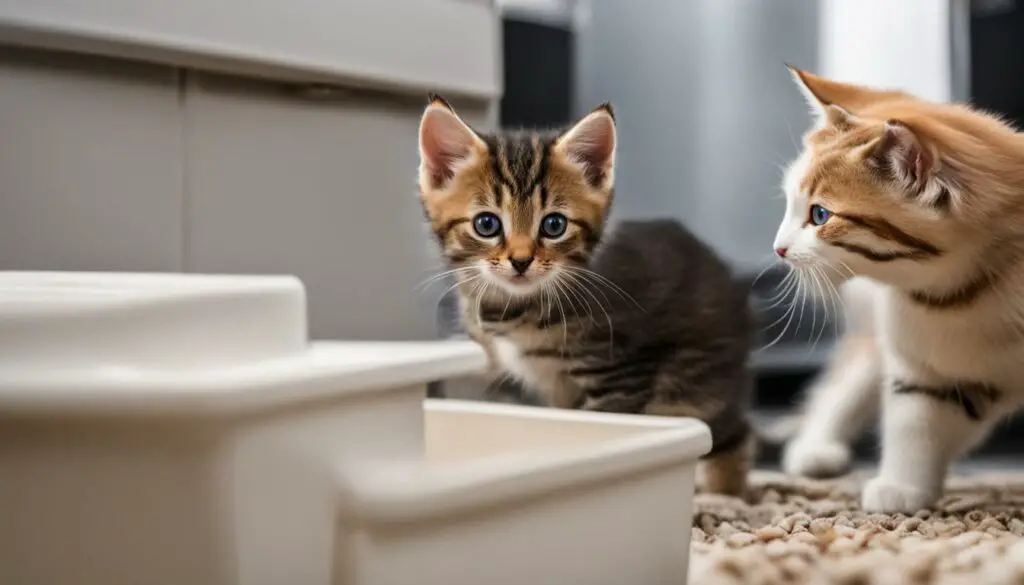
| Signs of a Healthy Kitten’s Bowel Movement | Signs of a Problematic Bowel Movement |
|---|---|
| – Firm and well-formed stool | – Loose or watery stool |
| – Easy passage without apparent discomfort | – Straining or crying during defecation |
| – Minimal odor | – Strong or foul odor |
| – Consistent bowel movement schedule | – Irregular or infrequent bowel movements |
Monitoring your kitten’s bowel movements can provide valuable insight into their overall health. If you notice any signs of problematic bowel movements, such as loose stool, straining, or strong odor, it’s important to consult a veterinarian. They can assess the situation and provide any necessary guidance or treatment.
Pain as a Cause of Kitten Crying
When a kitten is experiencing pain, they may cry or make loud shrieking noises to seek help and attention. It’s crucial for pet owners to be attentive to their kitten’s cries and assess the situation to determine the source of the pain. There are several possible reasons why a kitten may be in pain, including injuries, illness, or underlying health issues.
If you suspect that your kitten is in pain, it is important to seek veterinary assistance as soon as possible. A qualified veterinarian will be able to examine your kitten, diagnose the cause of the pain, and recommend appropriate treatment options. Remember, kittens are vulnerable and may not be able to communicate their pain effectively, so it’s essential to be proactive in addressing their needs.
“If you suspect that your kitten is in pain, it is important to seek veterinary assistance as soon as possible.”
Common signs of pain in kittens include limping, difficulty moving, excessive grooming of a specific area, changes in appetite or water consumption, vocalization during movement, or unusual behavior such as aggression or withdrawal. It’s important to note that kittens are delicate and their pain tolerance may be lower compared to adult cats, so even subtle changes in behavior should not be ignored.
Remember, as responsible pet owners, our primary duty is to ensure the well-being and comfort of our furry companions. By promptly addressing any signs of pain and seeking professional veterinary assistance, we can help alleviate our kittens’ suffering and provide them with the care they need to live happy and healthy lives.
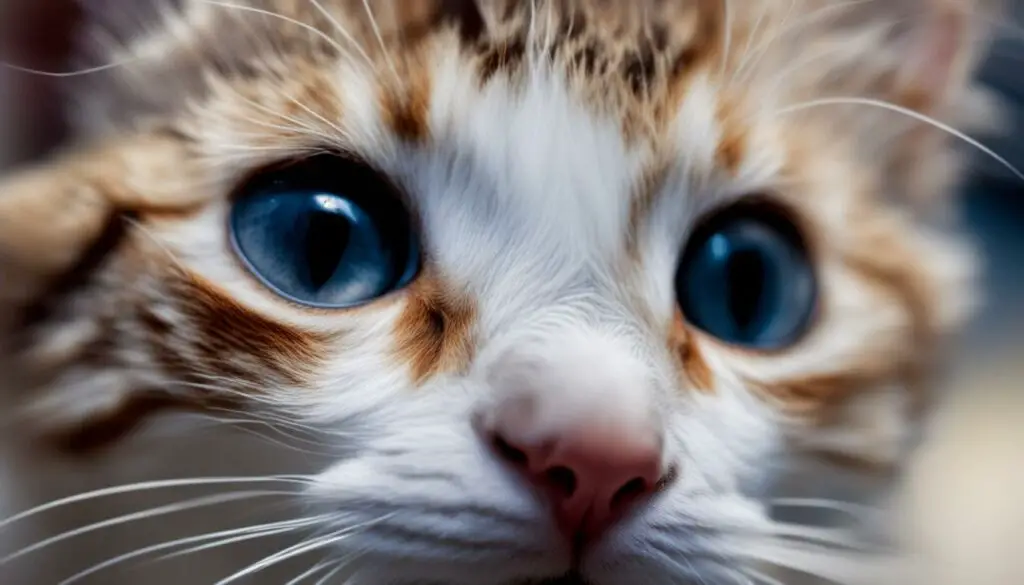
| Possible Causes of Kitten Pain | Symptoms to Look For |
|---|---|
| Injuries | Limping, difficulty moving, sensitivity to touch |
| Illness or infection | Changes in appetite, vomiting, diarrhea, lethargy |
| Dental problems | Difficulty eating, pawing at the mouth, bad breath |
| Urinary tract issues | Straining to urinate, blood in urine, frequent urination |
| Gastrointestinal problems | Abdominal pain, bloating, constipation |
| Orthopedic conditions | Joint stiffness, lameness, reluctance to move |
Sick Kitten: Identifying Signs of Kitten Distress and When to Seek Medical Attention
If your 8-week-old kitten is crying excessively and exhibiting unusual behavior, it may be a sign of illness or distress. It’s crucial to closely monitor your kitten’s health and seek medical attention when necessary. Here are some common signs of kitten distress and when you should consult a veterinarian:
Symptoms of Kitten Distress:
- Excessive crying or whining
- Lethargy and decreased activity
- Loss of appetite or refusal to eat
- Diarrhea or vomiting
- Difficulty breathing or rapid breathing
- Visible signs of pain or discomfort
If your kitten is exhibiting any of these symptoms, it’s essential to seek immediate medical attention. Kittens are more susceptible to illnesses and can deteriorate quickly if left untreated. A veterinarian will be able to diagnose the underlying cause of your kitten’s distress and provide appropriate treatment.
As a responsible pet owner, it’s important to be proactive in monitoring your kitten’s health and well-being. Regular check-ups and vaccinations are essential for maintaining your kitten’s overall health and preventing potential illnesses. Additionally, if you notice any sudden changes in behavior or any other concerning symptoms, it’s always best to consult your veterinarian for further guidance.
Remember, early detection and prompt medical intervention can help ensure the well-being of your kitten. By staying vigilant and seeking veterinary assistance when needed, you can provide your kitten with the best possible care and support during this critical stage of their development.
| Signs of Kitten Distress | When to Seek Veterinary Assistance |
|---|---|
| Excessive crying or whining | If crying persists and is accompanied by other concerning symptoms |
| Lethargy and decreased activity | If your kitten appears weak and lacks energy |
| Loss of appetite or refusal to eat | If your kitten refuses food for more than 24 hours |
| Diarrhea or vomiting | If your kitten experiences persistent diarrhea or vomiting |
| Difficulty breathing or rapid breathing | If your kitten is struggling to breathe or has rapid, shallow breaths |
| Visible signs of pain or discomfort | If your kitten displays signs of pain, such as crying when touched or avoiding movement |

Normal Developmental Stages for Kittens
As kittens grow, they go through various developmental stages that shape their behavior and physical capabilities. Understanding these stages can help you provide the appropriate care and support for your furry friend. Here are the key milestones you can expect during your kitten’s early months:
1. Neonatal Stage (0-2 weeks)
During the neonatal stage, kittens are completely dependent on their mother for survival. They are born blind and deaf, relying on their sense of smell and touch to locate their mother and find her milk. This is a crucial period for bonding and initial growth.
2. Transitional Stage (2-4 weeks)
As the kittens’ eyes and ears open, they begin to explore their environment and interact with their littermates. They start developing social skills, coordination, and start to wean off their mother’s milk and transition to solid food. This is a playful and curious stage.
3. Socialization Stage (4-14 weeks)
Kittens become more independent during this stage and start venturing further away from their mother and littermates. They are highly receptive to new experiences and social interactions, making it a critical time for introducing them to various people, animals, and environments to help shape their adult behavior.
4. Juvenile Stage (14 weeks and beyond)
At this stage, kittens’ growth rate slows down, and they continue to refine their coordination, hunting skills, and explore their surroundings. They may experience the teething process, which can cause discomfort and lead to increased chewing behavior. Providing appropriate chew toys can help alleviate teething discomfort.
Remember, every kitten is unique, and their development may vary slightly. It’s important to provide a safe and stimulating environment that allows them to explore, play, and grow at their own pace. Regular veterinary check-ups and vaccinations are essential to ensure their overall health and well-being.
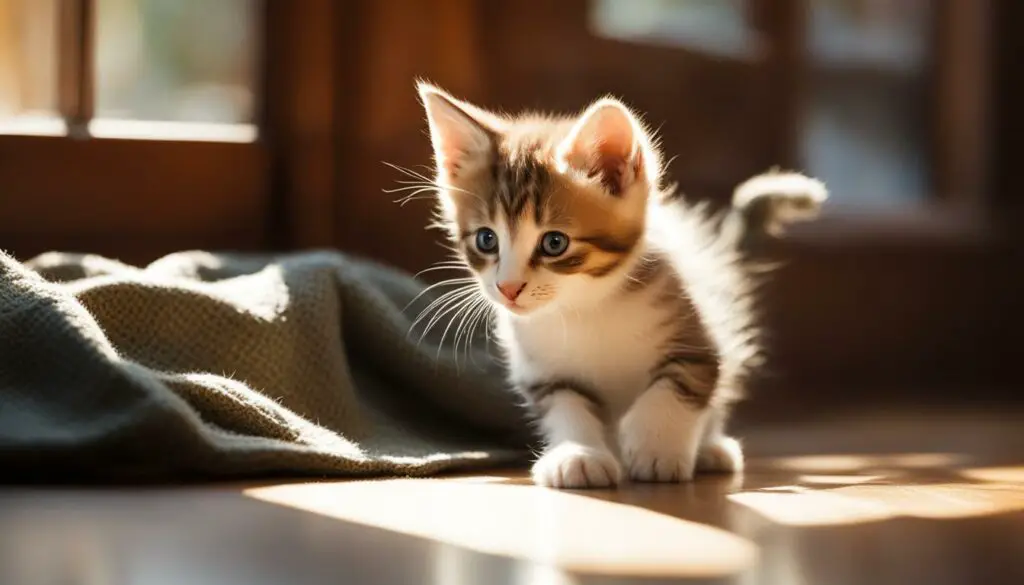
Soothing a Crying Kitten
When your precious little kitten starts crying, it’s natural to want to comfort them and provide the love and warmth they need. Here are some gentle and effective ways to soothe a crying kitten and create a sense of comfort and security for them.
1. Create a Cozy and Safe Environment
Ensure that your kitten has a warm and comfortable space to rest and sleep. Provide a soft bed or blanket where they can curl up and feel secure. It’s also important to make sure their environment is safe, free from any hazards that could cause injury or distress.
2. Provide Gentle Affection and Reassurance
Kittens crave attention and affection from their caregivers. Spend quality time with your little bundle of joy, gently stroking them and talking to them in a soothing voice. This loving interaction can help them feel comforted and reassured.
3. Engage in Playtime
Playtime is not only fun for kittens, but it also helps them expend energy and reduce anxiety. Engage in interactive play sessions using toys designed for kittens. This not only provides mental and physical stimulation but also strengthens the bond between you and your furry friend.
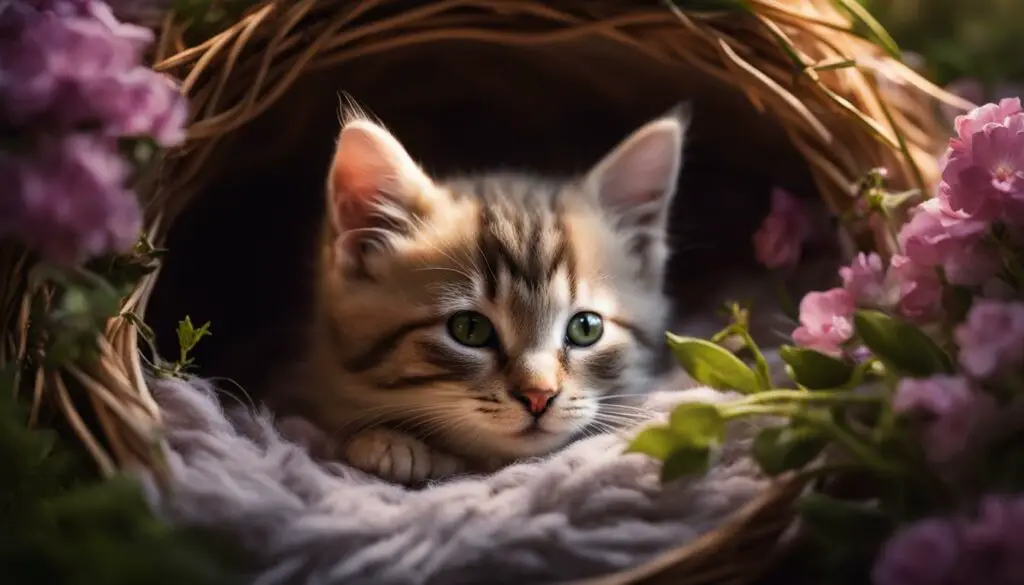
4. Meet Their Basic Needs
Make sure your kitten’s basic needs are met. Ensure they have access to fresh food and water, a clean litter box, and a designated scratching post. A well-fed, clean, and comfortable kitten is less likely to feel stressed or anxious, reducing the chances of excessive crying.
Remember, every kitten is unique, and it may take some time to determine the most effective ways to soothe them. Be patient, observant, and responsive to their needs, and you’ll create a loving and comforting environment that will help your kitten thrive.
Kitten Feeding Guidelines and Transitioning to Solid Food
Feeding your kitten the right diet is essential for their growth and development. Understanding the proper kitten feeding guidelines can ensure that they receive the nutrition they need at this crucial stage of their life. Additionally, transitioning them from a liquid diet to solid food is an important milestone that requires careful attention.
When it comes to feeding your kitten, it is recommended to consult with your veterinarian to determine the best diet for their specific needs. Typically, kittens require a diet that is high in protein, as it supports their muscle development. Look for a high-quality kitten food that is specifically formulated to meet their nutritional requirements. It is important to choose wet or dry food based on your kitten’s preference, as long as it provides a balanced diet.
As your kitten grows, you can start introducing them to solid food around 4-6 weeks of age. Begin by offering small amounts of wet food mixed with formula or water to create a soft consistency that is easy for them to eat. Gradually decrease the liquid content and increase the amount of solid food over a period of weeks until they are solely eating solid food. This slow transition helps their digestive system adjust and prevents any digestive upset.

In summary, understanding the appropriate feeding guidelines for your kitten and transitioning them to solid food is crucial for their overall health and well-being. Consult with your veterinarian, choose a high-quality kitten food, and gradually introduce solid food to ensure a smooth transition. By providing the right nutrition and monitoring their dietary needs, you can help your kitten grow into a healthy and happy adult cat.
Litter Box Training Tips for Kittens
Proper litter box training is crucial for kittens to ensure they develop good hygiene habits and reduce the possibility of accidents in your home. Here are some essential tips to help you successfully train your kitten:
Choose the Right Litter Box Size
When selecting a litter box for your kitten, it’s important to consider their size and age. A litter box that is too large may be difficult for a small kitten to access, while a box that is too small can be uncomfortable and discourage them from using it. Opt for a box that provides enough space for your kitten to comfortably turn around and dig.
Keep the Litter Box Clean
Kittens are naturally clean animals and prefer a pristine litter box. Scoop the litter box daily to remove waste and clumps, and completely change the litter at least once a week. This will ensure your kitten always has a clean and inviting space to do their business. Avoid using strong-smelling cleaning products, as they may deter your kitten from using the litter box.
Place the Litter Box in a Quiet and Accessible Location
Kittens appreciate privacy when using the litter box. Choose a quiet area in your home where your kitten can easily access the litter box without feeling vulnerable or interrupted by household activities. Avoid placing the litter box near their food and water bowls, as cats prefer to keep their toileting area separate from their eating area.
Positive Reinforcement and Patience
Positive reinforcement plays a crucial role in litter box training. Whenever your kitten successfully uses the litter box, praise them and offer a treat or a gentle pat to reinforce this desirable behavior. If accidents happen outside the litter box, avoid punishing your kitten, as this may lead to fear or anxiety around using the litter box. Instead, gently redirect them to the litter box and clean up the mess promptly to remove any lingering scent.
Remember that every kitten is unique, and it may take time for them to fully grasp litter box training. Be patient, consistent, and offer plenty of encouragement throughout the process. With time and positive reinforcement, your kitten will develop good litter box habits and have a happy and healthy toileting routine.
| Litter Box Training Tips for Kittens | |
|---|---|
| Choose the Right Litter Box Size | Ensure the litter box is an appropriate size for your kitten’s comfort. |
| Keep the Litter Box Clean | Scoop waste daily and change the litter weekly to maintain cleanliness. |
| Place the Litter Box in a Quiet and Accessible Location | Select a private area where your kitten can easily reach the litter box. |
| Positive Reinforcement and Patience | Reward your kitten’s successful use of the litter box and avoid punishment for accidents. |
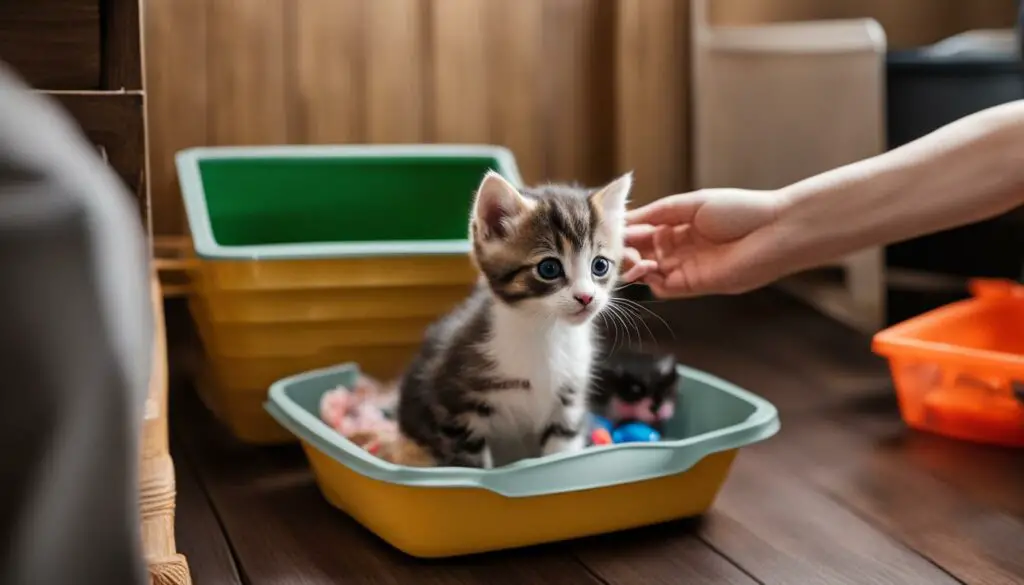
In the words of Mahatma Gandhi, “Be the change you want to see in your kitten’s litter box habits.”
Behavioral Changes as Kittens Grow
As kittens grow into adolescence and adulthood, it is common for their behavior to undergo various changes. Understanding these behavioral changes can help cat owners provide appropriate care and address any potential issues that may arise. Here are some key behavioral changes to expect:
1. Increase in Playfulness
Adolescent cats tend to exhibit an increase in playfulness as they explore their environment and develop their physical abilities. They may engage in more active play sessions, chasing toys, and climbing furniture. Providing interactive toys and playtime opportunities can help fulfill their need for stimulation and exercise.
2. Independence and Territory Marking
As kittens transition into adolescence, they may start asserting their independence and marking their territory. This can manifest in behaviors such as scratching furniture, spraying urine, or displaying territorial aggression towards other pets. Providing appropriate scratching posts, ensuring a clean litter box, and implementing positive reinforcement training can help curb these behaviors.
3. Sexual Maturation and Behavioral Changes
During adolescence, kittens undergo sexual maturation, which can lead to changes in behavior. Male cats may start spraying urine to mark their territory, and female cats may exhibit signs of heat, such as increased vocalization and restlessness. Spaying or neutering your kitten can help reduce these behaviors and prevent unwanted pregnancies.
| Behavioral Changes | Explanation |
|---|---|
| Increased aggression | Adolescent cats may display more aggressive behavior towards other pets or humans. This could be a result of hormonal changes and the desire to establish dominance. |
| Exploration and curiosity | Kittens in their adolescent stage may become more curious and explore their surroundings. They may try to climb on higher surfaces and investigate new objects. |
| Decreased tolerance for handling | Adolescent cats may become less tolerant of excessive handling and cuddling. They may prefer more independent interactions and may squirm or try to escape when held for longer periods. |
4. Litter Box Issues
During the adolescent stage, some kittens may experience litter box issues. This can include going outside the litter box or not covering their waste adequately. It is essential to maintain a clean litter box, provide multiple litter boxes in different locations, and address any underlying health issues or stressors that may contribute to this behavior.
By understanding and addressing these behavioral changes, cat owners can ensure a harmonious environment for their growing kittens and help them transition smoothly into adulthood. Regular veterinary check-ups are also crucial to monitor their overall health and well-being.

Seeking Veterinary Assistance
If your 8-week-old kitten continues to cry at night despite your efforts to address their needs, it may be necessary to seek veterinary assistance. Persisting crying and other signs of distress can indicate underlying health issues that require professional attention. Here are some signs that indicate it’s time to call the vet:
- Diarrhea or vomiting
- Lethargy or decreased appetite
- Difficulty breathing
- Visible injuries or wounds
It’s important to note that kittens are more vulnerable to illnesses and infections, so prompt medical care is crucial for their well-being.
“A kitten’s cries, especially when accompanied by other distressing symptoms, should not be taken lightly. It’s always better to err on the side of caution and consult with a veterinarian to ensure the best care for your furry friend.”
Veterinary care for kittens involves a thorough examination and potentially diagnostic tests to identify any underlying health conditions. The vet may also provide appropriate treatment, such as medications or dietary adjustments, depending on the diagnosis. Remember, early intervention can prevent further complications and promote a healthy and happy life for your kitten.

| Signs of Distress in Kittens | When to Call the Vet |
|---|---|
| Diarrhea or vomiting | When it persists for more than 24 hours or is accompanied by other symptoms. |
| Lethargy or decreased appetite | If your kitten appears weak, lacks energy, or shows a significant decrease in appetite. |
| Difficulty breathing | If your kitten is having trouble breathing, panting excessively, or making unusual noises while breathing. |
| Visible injuries or wounds | If your kitten has any visible injuries, bleeding, or wounds. |
Conclusion
In conclusion, understanding and addressing the reasons behind an 8-week-old kitten crying at night is essential for providing proper care and promoting a peaceful sleep routine. By implementing the following kitten care tips and nighttime routines, you can create a harmonious environment for both you and your furry friend.
Kitten Care Tips:
1. Provide warmth and comfort: Creating a safe and cozy space for your kitten with a soft bed, blankets, and a warm environment can help them feel secure and reduce nighttime crying.
2. Establish a routine: Consistency is key for kittens. Establish regular feeding, play, and sleep schedules to help them feel more secure and minimize anxiety.
3. Gradually transition to solid food: While kittens may prefer wet food initially, gradually introducing them to solid food based on their age and nutritional needs is important for their development and overall health.
Nighttime Routines:
1. Engage in playtime: Providing mental and physical stimulation through playtime before bedtime can help tire out your kitten, making them more likely to sleep through the night.
2. Create a calm environment: Minimize loud noises, bright lights, and distractions in the sleeping area to promote a relaxing atmosphere for your kitten to settle down.
3. Offer companionship and reassurance: Spend quality time with your kitten before bedtime, offering gentle affection and reassurance to help them feel loved and secure.
By incorporating these kitten care tips and establishing a consistent nighttime routine, you can help your 8-week-old kitten adjust and feel more comfortable, reducing nighttime crying and promoting a restful sleep schedule. Remember to consult a veterinarian if your kitten’s crying persists or if you notice any signs of distress, as they can provide further guidance and support in ensuring your kitten’s well-being.
FAQ
Why is my 8-week-old kitten crying at night?
There are several possible reasons for your kitten’s nighttime crying, including loneliness, confusion, hunger, the need to poop, pain, or illness.
How can I alleviate my kitten’s loneliness?
Spending quality time playing with your kitten and considering adopting an additional kitten for companionship can help alleviate their loneliness.
What can I do to help my kitten adjust to new surroundings?
Providing a smaller “home base” initially and gradually introducing more space in the house can help your kitten feel more comfortable and less anxious.
How should I address my kitten’s hunger?
Ensuring a proper feeding schedule and offering sufficient amounts of wet food, especially for young kittens, can address their hunger and reduce nighttime crying.
Why is my kitten crying before or during defecation?
Kittens who are still learning to use the litter box may meow before or during defecation. This behavior is normal as long as they are not straining or uncomfortable.
What should I do if my kitten is in pain?
If your kitten is experiencing pain, they may cry or shriek to seek help. It’s crucial to address the source of the pain and assess the situation for further care. Seeking veterinary assistance is recommended if there are any signs of injury or distress.
When should I seek veterinary assistance for my crying kitten?
If your kitten’s crying persists or is accompanied by other signs of distress, such as diarrhea, vomiting, lethargy, or decreased appetite, it’s important to consult a veterinarian for proper diagnosis and treatment.
How can I soothe a crying kitten?
Providing warmth, affection, and a safe environment, as well as meeting their basic needs, can help calm and reassure a distressed kitten.
What should I know about feeding my kitten?
Understanding the appropriate diet and feeding schedule for kittens is essential. Monitoring their growth and gradually transitioning them to solid food can ensure they receive proper nutrition.
How do I properly litter box train my kitten?
Ensuring the litter box is the right size, kept clean, and easily accessible can prevent litter box issues and reduce crying associated with discomfort or confusion.
How can I address behavioral changes as my kitten grows?
Monitoring any changes in litter box behavior and scheduling regular veterinary check-ups are essential for maintaining your kitten’s overall health as they go through different developmental stages.
When should I seek veterinary assistance for my crying kitten?
If your kitten’s crying persists or is accompanied by other signs of distress, such as diarrhea, vomiting, lethargy, or decreased appetite, it’s important to consult a veterinarian for proper diagnosis and treatment.








